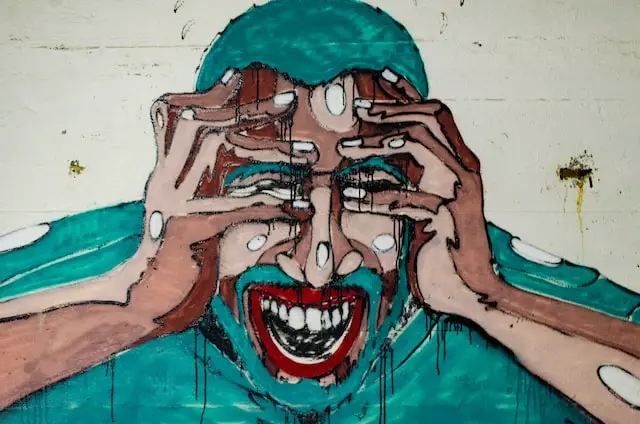Stress and depression are very common mental health issues, but it is important to understand their differences. Stress can be caused by a variety of external factors such as work or family pressures. On the other hand, depression is often related to an imbalance of hormones in the body that cause ongoing feelings of sadness and hopelessness. Stress is a response to a specific event or situation, whereas depression is a more long-term mental health condition.
What is Stress?
(Photo by Aarón Blanco Tejedor on Unsplash )

Stress is a natural response to challenging or threatening situations. It is a normal part of life and everyone experiences stress at some point. Common causes of stress include work-related pressure, financial worries, relationship problems, and health issues. When we experience stress, our bodies release hormones that prepare us to respond to the situation, this is known as the “fight or flight” response.
What is Depression?
(Photo by Gadiel Lazcano on Unsplash )

Depression, on the other hand, is a mental health condition that affects how a person feels, the way they think and how they behave. Unlike stress, depression is not a normal part of life and is not simply a response to a difficult situation. Depression can have a range of symptoms, including feelings of sadness, hopelessness, and worthlessness, difficulty sleeping or sleeping too much, loss of interest in things that were once enjoyable, and fatigue.
Stress Vs. Depression – Key difference
Stress can be caused by positive or negative events, such as starting a new job, getting married, or having a baby. It can also be caused by daily hassles like traffic jams and work deadlines. The key difference between stress and depression is that stress is usually temporary and goes away once the stressful event is over.
Depression, on the other hand, lasts for weeks, months, or even years. It can be triggered by a major life event such as the death of a loved one, but it can also occur without any obvious trigger. Depression affects how you think, feel, and behave, and it can make everyday activities seem impossible to accomplish. If you’re feeling depressed, you may have trouble sleeping or eating, feel hopeless or worthless, and lose interest in activities you used to enjoy.
Depression is a serious mental illness that causes a person to feel persistently sad and lose interest in activities. People with depression may also have sleep problems, low energy, and poor concentration. Depression can lead to physical health problems such as heart disease and stroke.
Stress is a response to a specific event or circumstance, whereas depression is a more lasting feeling of sadness and low mood. Depression can lead to physical symptoms such as fatigue, insomnia, and aches and pains, as well as emotional symptoms such as hopelessness, irritability, and low self-esteem. Depression is also more likely to interfere with daily activities and can be accompanied by suicidal thoughts.
If you’re struggling to cope with stress or depression, it’s important to seek professional help. A therapist can help you understand your thoughts and feelings and develop coping strategies to manage your stress or depression.
How to know if you are stressed or depressed
There are a few key ways to tell if you are stressed or depressed. First, take a look at your energy levels. If you are feeling low and sluggish, it may be a sign of depression. Secondly, pay attention to your sleeping patterns. If you are having trouble falling asleep or staying asleep, it could be a sign that you are stressed. Lastly, monitor your moods. If you are feeling down more often than usual, it may be a sign of depression. If you are unsure whether you are stressed or depressed, it is always best to consult with a doctor or mental health professional to get a proper diagnosis.
Stress is a common emotional state that can be identified by various physical, emotional, behavioral, and cognitive symptoms. Physical symptoms may include muscle tension, headaches, fatigue, changes in appetite, and sleep disturbances. Emotional symptoms can include anxiety, irritability, anger, and mood swings. Behavioral symptoms may include withdrawing from social activities, increased substance use, and changes in work or academic performance. Cognitive symptoms include difficulty concentrating, forgetfulness, and negative thought patterns.
If you are experiencing several of these symptoms, it may be a sign that you are stressed and it is important to seek help from a mental health professional if needed.
How to cope with stress and depression
When we are stressed, it is our body’s response to a demand. This can be physical, like when we exercise, or mental, like when we worry about an upcoming deadline. In either case, our body releases hormones like adrenaline and cortisol to help us deal with the stressor.
Depression, on the other hand, is a mood disorder that can be triggered by a variety of factors, including genetics, abuse or trauma, brain chemistry, or even certain medications. Depression can cause a wide range of symptoms, from fatigue and weight loss to difficulty concentrating and suicidal thoughts.
Exercise regularly: Exercise can help boost mood and relieve stress by releasing endorphins, the feel-good chemicals in the brain.
Practice good self–care: Get enough sleep, eat well, and engage in activities that bring you joy.
Connect with others: Spending time with loved ones and talking about your feelings can help reduce stress and improve mood.
Try mindfulness or meditation: Mindfulness and meditation can help you slow down, focus, and relieve stress.
Seek professional help: If your stress or depression is affecting your daily life, consider seeking help from a mental health professional. They can help you develop a treatment plan and provide additional coping strategies.
Consider therapy: Therapy can be an effective way to manage stress and depression by providing you with a safe space to talk about your feelings and develop coping strategies.
Use stress management techniques: Techniques such as deep breathing, progressive muscle relaxation, and visualization can help you manage stress.
Remember, it’s important to be kind to yourself and seek support from loved ones and healthcare professionals as needed. With time and the right support, it is possible to manage stress and depression and improve your overall well-being.
What is the relationship between stress and depression?
Stress and depression are related in that stress can lead to depression, and depression can make stress more difficult to manage. Stressful events, such as the loss of a loved one, a difficult relationship, or a major life change, can trigger feelings of sadness, hopelessness, and helplessness that may develop into depression. At the same time, depression can increase feelings of stress by making it difficult to cope with everyday challenges and responsibilities. The persistent negative thoughts and feelings that are associated with depression can also make it more difficult to manage stress, leading to a vicious cycle of stress and depression.
The major signs of depression
There are a number of major signs that can indicate someone is suffering from depression, rather than simply feeling stressed. These include:
- A persistent low mood or sense of sadness
- A loss of interest in activities or hobbies that were previously enjoyed
- A feeling of hopelessness and helplessness
- A lack of energy and motivation
- Poor concentration and memory
- Changes in appetite or weight
- Sleep problems
- Physical aches and pains
- Loss of libido
- Anxiety or panic attacks
If you are experiencing any of these symptoms, it is important to seek help from a medical professional, as they can help you to determine whether you are suffering from depression or stress.
The major signs of stress
There are a number of major signs of stress that can help you to identify whether you are simply stressed or if you may be suffering from depression. These include:
- Feeling overwhelmed or unable to cope with demands
- Feeling constantly anxious, irritable or on edge
- Losing interest in activities that you used to enjoy
- Sleeping badly or feeling tired all the time
- Struggling to concentrate or remember things
- Avoiding other people or social situations
- Feeling tearful or hopeless
What is the mental signs of stress?
When someone is stressed, they may experience a variety of mental signs. These can include feeling anxious, irritable, or on edge. A person may also feel more forgetful, have trouble concentrating, or feel like their mind is always racing. Additionally, a person who is stressed may have trouble sleeping or may find that they are more easily agitated. If you are experiencing any of these mental signs, it may be indicative of stress.
What are the dangers of stress?
There are a number of dangers associated with stress, both mental and physical. When we experience stress, our bodies go into fight-or-flight mode, releasing a surge of hormones like adrenaline and cortisol. These hormones can be beneficial in small doses, but when they’re constantly being released, they can lead to a number of problems, including:
- Anxiety and depression
- High blood pressure
- Heart disease
- Stroke
- Obesity
- Diabetes
In addition to the physical dangers of stress, it can also take a toll on our mental health. Stress can exacerbate existing mental health conditions like anxiety and depression, and it can also lead to new problems, such as insomnia or substance abuse.
Does crying relive stress?
Crying is often thought of as a stress reliever, but does it actually help to reduce stress levels? While crying may provide temporary relief from stress, it doesn’t actually reduce the amount of stress in your life. In fact, studies have shown that crying can actually increase levels of the stress hormone cortisol.
So if you’re feeling stressed, it’s best to try other methods of relaxation such as deep breathing or meditation. If you find yourself crying often, it may be a sign of depression and you should talk to a doctor or therapist.
What are the dangers of depression?
Depression is a serious mental illness that can have devastating consequences. It can lead to suicide,
Depression is a serious mental health condition that can have far-reaching impacts on an individual’s life. Depression can affect a person’s relationships, work, and overall well-being, leading to decreased quality of life. Depression can also increase the risk of developing other physical health conditions, such as heart disease or stroke, due to the negative impact it has on lifestyle habits, such as exercise and diet.
Depression can also lead to severe negative thoughts and feelings, including thoughts of self-harm or suicide, which is the 10th leading cause of death in the United States. Depression can also lead to substance abuse, job loss, and social isolation. In severe cases, depression can cause individuals to lose hope for the future and make it difficult for them to find joy and fulfillment in life.
It is important for those experiencing symptoms of depression to seek help from a mental health professional to receive the appropriate treatment and support. With the right treatment and support, it is possible to manage depression and improve overall well-being.
How to overcome depression
Depression is a serious mental illness that can cause significant problems in a person’s life. It can interfere with a person’s ability to work, study, eat, sleep, and enjoy activities that once were pleasurable. Depression symptoms can also lead to substance abuse and other self-destructive behaviors.
The good news is that depression is treatable. There are many effective treatments for depression, including medication, psychotherapy, and other interventions. With treatment, most people with depression will improve and will be able to return to their normal activities.
Reach out for support: Talk to friends, family, or a mental health professional about what you’re going through. This can provide you with a supportive network and a safe space to discuss your feelings.
Exercise regularly: Exercise can help improve mood, boost energy levels, and reduce symptoms of depression.
Practice self-care: Get enough sleep, eat a healthy diet, and engage in activities that bring you joy.
Try therapy: Therapy can provide you with the tools and support needed to manage your symptoms and improve your overall well-being.
Consider medication: In some cases, medication can be an effective treatment for depression. Antidepressant medication can help improve mood and reduce symptoms of depression.
Challenge negative thoughts: Negative thoughts and beliefs can contribute to depression. Try to identify and challenge these thoughts, and focus on positive self-talk and realistic thinking.
Focus on self-improvement: Engage in activities that help you grow and improve, such as learning a new skill or volunteering.
Do you need to take medication to overcome depression?
There are many different types of medication available to treat depression, and the decision about whether or not to take medication is a personal one. Some people find that medication helps them to feel better, while others find that it does not help them much or causes unwanted side effects. If you are considering taking medication for depression, it is important to talk to your doctor about the risks and benefits.
Does depression lead to medical conditions?
Depression has been linked to a number of medical conditions, including heart disease, stroke, and diabetes. While the exact relationship between depression and these conditions is not fully understood, it is clear that there is an association between the two. Depression may also contribute to the development of certain medical conditions, or make existing conditions worse.
How to overcome stress?
There are a number of ways that you can overcome stress. First, it is important to identify the sources of your stress. Once you know what is causing your stress, you can begin to take steps to eliminate or reduce those sources. In addition, there are a number of relaxation and coping techniques that can help you deal with stress in a more positive way.
- Exercise regularly: Exercise can help reduce stress and improve overall well-being by releasing endorphins and reducing tension.
- Practice mindfulness and relaxation techniques: Mindfulness meditation, deep breathing exercises, and progressive muscle relaxation can help reduce stress and improve relaxation.
- Get enough sleep: Sleep is important for physical and mental health, and lack of sleep can increase stress levels.
- Eat a healthy diet: A well-balanced diet can provide the nutrients and energy needed to manage stress.
- Connect with others: Spending time with friends and family, volunteering, or joining a support group can provide a sense of community and help reduce stress.
- Identify and manage stressors: Identifying the sources of stress in your life and developing strategies for managing them can help reduce stress levels.
- Limit alcohol and caffeine: Excessive alcohol and caffeine intake can increase stress levels.
- Practice stress management techniques: Stress management techniques, such as time management, problem-solving, and goal-setting, can help you manage stress more effectively.
It’s important to remember that what works for one person may not work for another, and it may take some experimentation to find the best stress management strategies for you. If you are unable to manage stress on your own, seeking help from a mental health professional can provide additional support and guidance.
Does stress cause medical conditions?
Yes, stress can contribute to the development of various medical conditions. Chronic stress can have a negative impact on the body and can lead to a range of physical health problems, including:
- Heart disease: Chronic stress can increase the risk of heart disease by causing changes in blood pressure, heart rate, and cholesterol levels.
- Gastrointestinal problems: Stress can trigger digestive problems, such as acid reflux, irritable bowel syndrome (IBS), and ulcers.
- Headaches: Stress can cause tension headaches, migraines, and other types of headaches.
- Skin conditions: Stress can worsen skin conditions, such as psoriasis, eczema, and hives.
- Sleep problems: Stress can interfere with sleep, leading to insomnia and other sleep disorders.
- Weak immune system: Chronic stress can weaken the immune system, making it more difficult for the body to fight off infections and illnesses.
It is important to manage stress in a healthy way, such as through exercise, mindfulness, and stress management techniques, in order to reduce the risk of developing medical conditions. If you are experiencing symptoms of a medical condition, it is important to seek help from a healthcare provider.
Is there a test to check for stress?
There are a number of tests available to check for stress. However, it is important to note that these tests are not always accurate and should not be used as a sole means of diagnosing stress. Some common tests used to measure stress levels include:
The Perceived Stress Scale (PSS): This scale measures the degree to which individuals feel stressed. It consists of 14 items that assess how much control an individual feels they have over stressful situations, how often they feel tense or nervous, and how often they experience symptoms of depression or anxiety.
The Spielberger State-Trait Anxiety Inventory (STAI): This test measures both state and trait anxiety. State anxiety refers to the current level of anxiety an individual is experiencing, while trait anxiety refers to an individual’s general tendency to experience anxiety. The STAI consists of 20 items that assess an individual’s feelings of tension, worry, irritability, and fatigue.
The Life Experiences Survey (LES): This survey assesses an individual’s exposure to stressful life events. It consists of 33 items that assess the frequency and severity of stressful life events experienced in the past year.
Is there a test to check for depression?
Depression is a serious mental illness that affects millions of people around the world. While there is no single test to diagnose depression, there are a number of screening tools that can help identify whether someone is struggling with the condition.
The most commonly used screening tool for depression is the Patient Health Questionnaire (PHQ-9). The PHQ-9 is a nine-question quiz that asks about common symptoms of depression, such as feeling down or hopeless, having little interest or pleasure in activities, and experiencing changes in sleep or appetite.
If you are concerned that you or someone you know may be depressed, it is important to talk to a doctor or mental health professional. They can administer the PHQ-9 or other tests to determine if Depression is present and develop a treatment plan accordingly.
Featured Image By – Photo by Francisco Moreno on Unsplash









